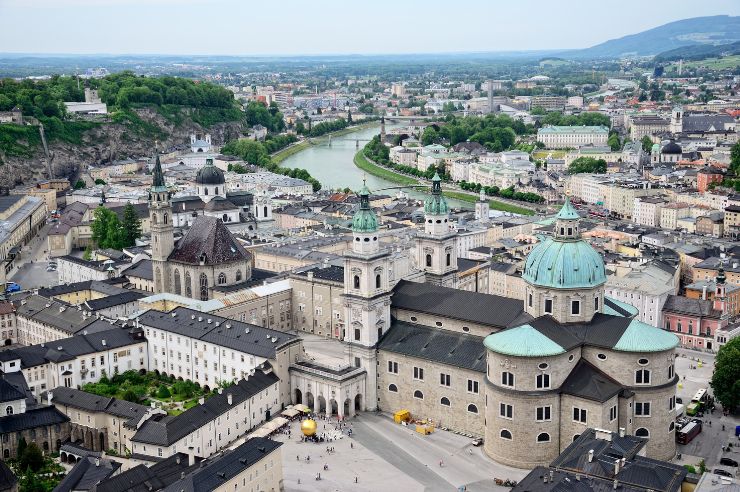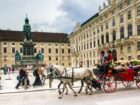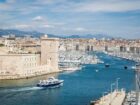Travelers to Europe often ask whether they should choose Munich, a major city in Germany, or Salzburg, a small town in Austria, for a short stay in the area.
The two cities are only about an hour and a half away from each other by car or public transportation, and both are attractive from a visitor’s standpoint, each in a very different way.
Munich is a modern city with great nightlife and a Bavarian cultural scene, world-class museums, impressive castles, and a famous beer festival. Salzburg is a picturesque town with a stunning medieval old town, an impressive hilltop castle, and gorgeous nature and mountain surroundings.
Munich is the third largest city in Germany with about 1.5M souls. It sits near the Southern border of Germany, about an hour’s drive from Austria, on the Isar River close to the Alps mountains.
Munich is the capital of the Southern state of Bavaria. It has thriving automobile and high-technology industries. It’s one of the most prosperous and fastest-growing cities in Germany. The city is home to international organizations, major universities and museums, and highly active theatres.
Salzburg, Austria is a small town (150.000 inhabitants) with a very rich history that dates back to the Roman Empire. Sitting on the edge of the Alps, it was the salt trade that made Salzburg a European powerhouse in the Middle Ages.
Salzburg attracts millions of visitors each year. The historic center is a UNESCO World Heritage Site, with baroque-style buildings and narrow streets. Salzburg is also surrounded by the scenic Austrian Alps.
Salzburg is the birthplace of Wolfgang Amadeus Mozart and has many museums, concerts, and other cultural events dedicated to the composer.
What travelers say
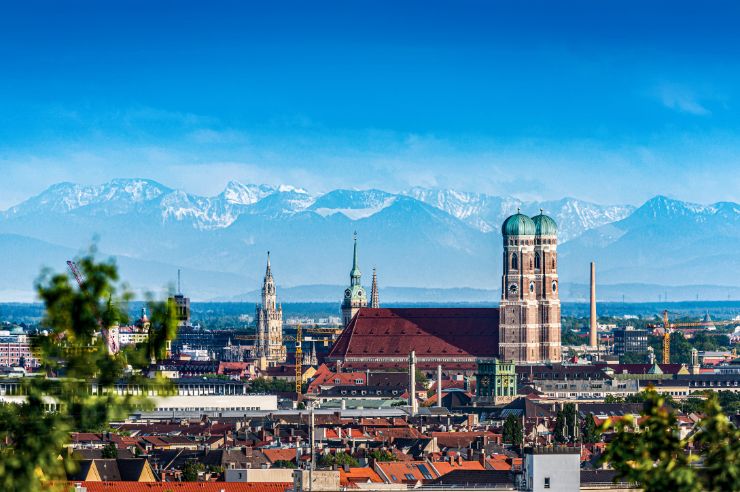
- Salzburg is much smaller and more compact than Munich, with a small-town feel. Most of the scenic sights in the old town can be visited on foot in one or two days. Munich is a big city with many things to see and do, which requires more time
- Salzburg is charming and relaxed and has gorgeous architecture, churches, and history. It has attractive squares and pleasant cafés with a nice vibe for hanging out. Travelers are often mesmerized by Salzburg’s small-town beauty.
- Salzburg has breathtaking scenery, stunning hilltop castles, a few Baroque churches, a scenic river, and many day trip options for exploring the surrounding nature and mountains.
- When it rains in Salzburg, finding things to do comfortably is harder, whereas Munich has plenty of indoor options including museums, concerts, and historic cafés.
- Many people love Munich because it has history, technology, nature, great public transport, and a cosmopolitan population with a significant international community.
- Munich has great museums (art, technical, cars), the famous English Garden scenic park, the Viktualienmarkt (a very large, 1800s outdoor food market), and the proximity to the Alps. It also has great castles, lakes, and Bavarian food.
- Munich is an active city with lots of visitors. It’s much more modern than Salzburg. Three days can only scratch the surface of the interesting things in and around Munich.
- For nightlife, Munich wins hands down. While Salzburg has a great deal of atmosphere and it’s nice to stroll its old town, especially at night, the sights are relatively limited.
- Salzburg is sometimes dubbed the Disneyland of classical music.
- If you choose Munich but dislike it, you can always take the train to Salzburg for the day, and on to Hallstatt the next day.
Getting around
Munich has the second busiest airport in Germany following Frankfurt, with flights to and from a large number of European and international destinations.
Munich is a traffic hub with excellent international, national and local connections, running a fast and reliable public transport system.
From Munich, if you want to see the castles, renting a car is a good option and will cost you the same as public transportation for two or three people.
Salzburg has an eco-friendly transportation system with electric trolleys running at 10-minute intervals and regular buses running at 15-minute intervals during the day. You can get a card for use across all public transport at the train station.
Vibe & people
Munich
Munich’s center is more modern with a big city feel, not as atmospheric as Salzburg. It still has an Old World type of feel, however, with a very open, vibrant, and sociable vibe. While it helps if you understand some German, many of the locals speak good English.
Contrary to the “cold” German stereotype, the locals in Munich are welcoming, including in small villages outside the city – which commonly have festivals, hiking groups, etc.
Munich is closer to the Bavarian lifestyle, distinct from other parts of Germany. The city is surrounded by rural areas and has the Alps as a backdrop.
Although most of the architecture was demolished in World War II, Munich’s center is beautiful with many old restaurants and pubs. It’s always full of tourists seeking to drink good beer and eat Neuschwanstein.
Munich is generally quite expensive with many well-paid foreign expats living in the city. It’s a safe city with very low crime rates by German standards.
Salzburg
Salzburg is a very walkable and attractive little city with stunning views, e.g. from the walking bridges toward the old town, including at night.
The old town itself is scenic with its cobbled streets, hidden alleyways, and the great-looking mountains and castle above.
Next to the center, the Kapuzinerberg area with its 640-meter-high mountain, dense forests, churches, abbey, and hiking paths, is also a major attraction.
Travelers choose Salzburg for its unique beauty, but also for the welcoming locals, good restaurants (outside the tourist traps), and easily-to-access surrounding sights.
Compared to Munich, Salzburg provides a more relaxing experience strolling around the streets, gardens and squares, markets, sitting at coffee houses, and chatting with people. The people are friendly and cheerful, and many locals speak pretty good English.
Travelers sometimes complain about the high number of tourists in Salzburg including in off-season months. The city’s shopping street gets invaded by Mozard memorabilia buyers, and costumed street performers are just about everywhere. Some visitors get “Mozart overload” after visiting Salzburg.
Salzburg is a music mecca. There are always several day and evening concerts going on in Salzburg. Going to an evening concert in Mirabell Platz is memorable.
Sights & culture
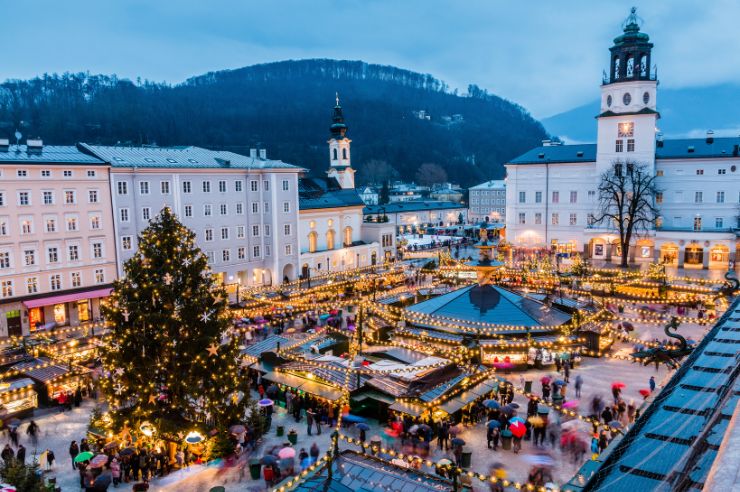
Munich
Munich has numerous architectural attractions, international sports events, exhibitions, and conferences. The annual Oktoberfest attracts a considerable number of tourists annually.
A key attraction in Munich is the BMW museum where you can see great motorcycles, historical vehicles, and concept cars with futuristic designs. See this article for some cool details.
Historically, Munich was the capital of the Kingdom of Bavaria, so it has many royal palaces to visit. Munich is full of old European castles including Burghausen Castle, Neuschwanstein Castle, Nymphenburg Palace (former home of the Wittelsbachs dynasty), Linderhof Palace, Munich Residenz, and Hohenschwangau Castle.
In Munich, the center of animation and sightseeing is Marienplatz. From there you can take a stroll to the English Garden Park (Europe’s largest urban public park, larger than Central Park) or the Olympia Park, and walk into a few beer gardens and beer halls for some Masses of Helles beers.
Munich has impressive museums, including Science and Technology, the Deutsches Museum, and the world-class Alte Pinakothek art gallery. The city also has great churches with stunning architecture like the Frauenkirche and St. Peter’s Church.
River surfing on the Eisbach River is very popular in Munich in the summer months – more here about river surfing in Munich.
Salzburg
Here are some of the main attractions In Salzburg:
- Hellbrunn Palace, a stunning 17th-century Baroque villa. Closed in the winter
- Hohensalzburg Fortress: one of the largest medieval castles in Europe (11th century) with great views from atop the 500m hill. Nice cable car to get there.
- Cathedral: a beautiful, bright, Baroque church with gorgeous frescos and an impressive Romanesque front.
- Franciscan Church: a beautiful mix of Romanesque nave and Gothic choir, Baroque chapel
- Mozart’s birth house and Museum – bring Mozart to life
- Mirabellgarten: elegant gardens and floral displays in front of the Mirabell Palace
- Salzach River cruises
- Sound of Music locations: visit to places and homes where the international hit movie from the 60s was filmed in (and where the Trapp family lived) in and around Salzburg
- Tour of the Festspielhaus where the Salzburg Festival is held
- 1913 Marionetten Theater (puppet theater)
Wandering around the old town, you can see most sights in around 2 hours. The Salzburg card gives you access to many sights (Hellbrunn Palace, river cruiser, castle, Mozart locations, mountain trip including bus) at a cost-effective price.
You can take a walk up to Mönchsberg, then have a coffee at M2 Restaurant.
In Salzburg, you’ll find regular classical and folk music shows. the Bavarian State Opera has outstanding productions.
You can also take great trips to scenic lakes and mountains (see the “Day trips” section below).
Food & nightlife
Munich
In Munich, you’ll typically have a nice Schweinshaxn in traditional beer halls (Biergartens) near Marienplatz – a popular Bavarian dish made of a pork shank cooked for hours and served with sauerkraut. You may also have a Leberkäsesemmeln (corned beef pork and bacon) or a Brezen (pretzel).
You can catch a great brunch at Ratskeller or at Art and Boards (Belgradestrasse) on Sundays. For a nice dinner, check out Hofbrau Munchen.
Hofbräuhaus München, “the court’s brewhouse”, is a large brewery in Riem on the outskirts of Munich. Very touristy but lots of fun. Travelers often recommend doing an evening beer tour in Munich.
Salzburg
Salzburg has a few great places for having a meal, such as the Stiftskeller St. Peter, considered one of the oldest restaurants in Europe – many travelers love the food there.
Gablerbräu is another example, located in the Linzer Gasse Hotel in an old Patrician house in the new town. The place serves copious Austrian food and great dark beer.
Zum Fidelen Affen, in the new town, is a small traditional guest house and restaurant catering mostly to locals.
Untersberg Hut is a rustic hut on top of Untersberg Mountain, accessed by cable car.
Salzburg also has some very nice coffee houses such as Café Schatz, a small café and pastry shop next to Mozart’s birthplace in the old town, or Café Tomaselli, another historic but touristy and crowded place.
If you walk along the river from the station on the right bank, you’ll find little shops serving great strudel and cafe by the river.
When it comes to nightlife, evening castle concerts at the Fortress and Schloss Mirabell are a must-see.
Salzburg has a handful of Irish Pubs including O’Malley’s, Murphy’s Law Irish Pub, Shamrock Irish Pub, and Dubliner. There is also a Jazz Club on Elisabethstrasse. Bricks Music Bar is another lively which opens until 4:00 am.
The Salzburg Festival held in late July and August brings a lot of life and animation.
Shopping
Munich
Munich has several luxury shopping streets such as:
- The renowned Maximilianstrasse, a 1 km long stretch of luxury shops
- The Theatinerstrasse, also an upmarket shopping area,
- Kaufingerstrasse, the city’s prime pedestrian shopping zone
- Sendlinger Strasse, one of the oldest shopping streets in Munich with primarily smaller, family-owned local shops.
During the Christmas season, Munich has large and impressive street markets, often considered the best in Germany. It also has a fair number of conveniently located malls and shopping centers.
Salzburg
- Getreidegasse is a historic street lined with high-end fashion brands, jewelry stores, and souvenir shops.
- Mirabellplatz is a popular shopping destination with numerous shops, cafes, and restaurants.
- The Old Market is a favorite among locals and tourists alike. Vendors selling fresh produce and handmade crafts.
- Europark Salzburg has a wide range of stores and brands including Louis Vuitton, Gucci, and Prada.
Lodging
Munich
These are a few recommendations from travelers in Munich:
- The Carlton Astoria in the pleasant Schwabing district, a small hotel with few spacious and comfortable rooms, near a U-Bahn stop and the art museums. Just off lively Leopoldstrasse with its many shops.
- Mueller Hotel near the Sendlinger Tor and Marienplatz
- The Einhorn, a simple but Art Deco-style hotel near the train station and shopping district
Salzburg
In Salzburg, travelers like the Auersperg boutique hotel, a nice and clean hotel with friendly staff, within walking distance of the train station and the old town area (a 10-minute walk).
Hotel Goldener, a small and quaint place in the old town, is another recommended option.
Auerhahn Gasthof is just a short walk to the right as you leave the train station. The food is fantastic and very authentic. It has an outside dining area to relax and have a meal or a drink.
Austrotel Salzburg is a 4-star hotel in the new town. It’s centrally located and has buses stopping at the door. It’s not particularly attractive but has very friendly staff and good service. Rooms on the backyard side are quieter than those on the street side.
As Salzburg can get quite touristy, some travelers prefer to stay in the surrounding towns instead, which are all well-connected through efficient and affordable public transportation.
Mondsee for example is a lakeside town with beautiful nature and nice dining options 45 minutes from Salzburg.
Day trips
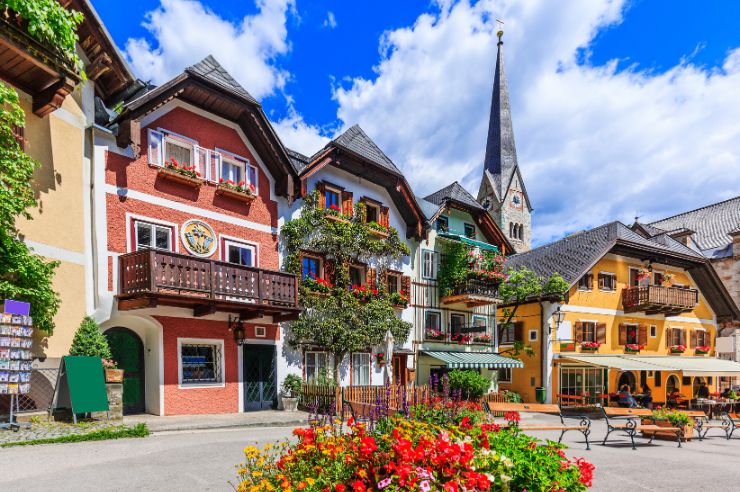
Munich
Munich is an excellent base for day trips, namely to the Bavarian Alps – Füssen, Neuschwanstein Castle, Garmisch-Partenkirchen, and Mittenwald.
You can take a day trip to Zugspitze, Germany’s highest mountain summit about 1h30 away from the city.
You can also visit medieval cities like Landshut, and Regensburg through day trips.
You can also visit the Neuschwanstein fairytale castle about 2 hours away on the edge of the Alps near Fussen. You can also stop at Starnberg Lake for a nice boat tour.
You can buy the Bayern ticket which gives you unlimited public transport travel within Bavaria for a full day.
The Dachau former concentration camp may deserve a day trip, a somber and powerful memorial to the victims of the Nazi regime. The site includes a museum with exhibits about the life of prisoners, preserved barracks and gas chamber.
Salzburg
Salzburg is close to the countless small and beautiful villages of the Salzkammergut region. Renting a car is a good option for driving to St Wolfgang, Bad Aussee, Mondsee, St. Gilgen (scenic route, lovely mountain hikes), all under an hour away. You can also take the bus to most villages.
Other day trips around Salzburg include visits to the Hohenwerfen Castle, the Schafberg mountain and its spectacular views, the world’s largest ice caves, the 7000-year-old Hallein salt min and museum. Hallstatt is a beautiful town.
You can visit nearby Berchtesgaden (Germany) which has Hitler’s historic Eagle Nest retreat and other World War sites.
There are several castles in the Salzburg area such as the very ornate Herrenchiemsee Palace in Prien (West of Salzburg), which is accessed via a scenic boat ride. You can also visit Melk Abbey and its incredible church and library.
If you’re into hiking, you can take an excursion to the Untersberg alpine mountain, by bus then cable car to the mountain top where you can go hiking in the snow. The Salzburg card includes a trip there.

